Text
two weeks, tops | karl weissman

Summary: The plan: adopt an evacuee to help on your Inverness farm. Not the plan: adopting two.
hi, it's me again! i've been away for a while (sorry) but the power that karl weissman holds is vast and only a fix-it fic for him and esther can save my soul. we'd all love to adopt them. if you haven't watched netflix's bodies, definitely give it a shot! if anyone has any ideas for lovely karl, please comment or send them in! i'd love to write more for him and some pointers would be great. <3warnings: mentions of war and death, mourning. karl using yet another name. word count: 2666 written by: archie

You hovered on the platform, watching as the countless evacuees from London came pouring out of the carriages. Dozens on dozens of children, ready for a new, safer life. They were each swept up by loving new mothers, fussing over their name tags and taking their wee little suitcases, escorting them to cars and buses for a few years of family. The smiling kids were chosen first. They’d clearly had coaching on how to be picked, smiling through the trauma of being uprooted from their lives and planted into the unknown. And then, one by one, the sorry looking ones were claimed. Tatters for clothes, no luggage, barely a silver coin to offer their new parents.
You could give them a better life. You could have, with your chickens and sheep. There’d be eggs for breakfast, newly knitted cardigans, markets on weekends-- and no air raids at all. You’d be warm to the new presence in your cottage, happy even to take siblings that didn’t want to be split, and yet… You just hovered there, wringing your hands, letting every opportunity hurry by. It wouldn’t be hard to reach out and introduce yourself. Why didn’t you? Why couldn’t you bring yourself to step amongst the aspiring foster parents, offering your life to the sweetlings that so desperately needed it?
You sighed, the ache in your chest hollowing as the train departed the station once more. The chatter of evacuees and new parents trickled away, eventually leaving an almost barren platform. The bite of Scottish air dusted your nose pink, but you weren’t sure that the water in your eyes was from the chill.
It wasn’t your first time almost taking in an evacuee. It’d been the same every time. You’d excite yourself with the prospect of the weekly train from London, the thought of a happy little voice in your cottage instead of the silence of your own existence and the occasional caw of a cockerel. You really needed it. To have someone around again. And it always seemed like such a good idea until you were stood on the platform, faced with the reality of the responsibility of a child on your own. A far cry from the future you’d imagined. You and your husband, raising a wee happy family of your own.
Ever since your husband had responded to the war’s call for soldiers, you’d intended to do your best for the war effort and save a child from the bombs of the London Blitz, like a practice for when he came home and you could try for a real family, bringing you a step closer to everything you’d wanted.
Until the postman brought one fateful letter, ending your ideal future and shaking you to the core. Your husband wouldn’t be returning, you wouldn’t have a child with him. The thought of bringing a child into your house and doing it alone…
Then why did the empty platform, devoid of opportunity, hurt you so? Ah, maybe if there was just one child left. A sad, lonely one, hiding somewhere? There’d be so much in common.
You steeled yourself, deciding that on the off chance there was one poor evacuee left in need, you’d take them in, no questions asked. No thinking. No room for doubt. It was time to be stern with yourself, so you marched up the platform, looking in the crevices of the station building, anywhere that a poor wee soul might fold themselves in a corner. The telephone nooks would be the most likely spot.
And sure enough, there was a child! A little girl in a bright red, soot-ridden coat. Only… She was already with a foster parent, peering up at the sharply-dressed man in a trilby hat while he was on the phone.
Her eyes were so round and sweet, her little fist clinging to the edge of the man’s coat, and something unpleasant made a home in your chest. Why did he get to have a child? Sure, he must be on good money to wear a pin-striped suit like that, important enough not to be called away for the military. Maybe he had a wife waiting for them back at home. Why should he have a spouse and a child when you had neither? And she seemed so lovely, too…
You met her eye accidentally, and couldn’t help noticing how absolutely exhausted she seemed. She clearly hadn’t had a bath in days and was in desperate need of a hot meal. The reality dawned on you, and you couldn’t help feeling guilty for your assumptions about the man. You had no business thinking in such a way. She needed all the help she could get, and the suited man was kind enough to offer it to her. He didn’t deserve your disapproval. You mustered the strength and offered the girl a smile and she gave one in return, her eyes so visibly haunted. She’d been through so much, and you’d never know.
You looked away before your smile turned sad. You’d finally decided on taking in an evacuee, only there were no more coming until next week. And by then, you’d probably need convincing all over again, and you’d miss that chance too.
It was a lot to handle. The urge to cry wasn’t sudden, but it was strong. You glanced around and spotted a nearby bench, but before you could take a step, you heard it.
The man’s accent. It didn’t make sense. The foster parent, who you’d assumed was a Scotsman if he lived locally, had a deep Cockney accent. “Nah, I got a kid with me now. You gotta put us up for a while ‘til I can sort summat out. Two weeks, tops.”
Something about the words stilled your feet, the bench blurred in your tearful vision. Saying you tried not to listen in would’ve been a lie. It was your first time hearing such an accent not on an evacuee and something about it was obnoxiously intriguing. That, and the fact he… He needed somewhere to stay? Had he travelled on the train with the evacuees?
“Mike, just shut your kisser and listen for a sec. I’ve got ‘er with me and there’s- No, no. Don’t you fucking call ‘em.” A long pause. With the outburst, you couldn’t help but glance back to the man hunched at the telephone. The little girl’s face told you it all. Those furrowed brows, the worry in the shallow lines of her forehead as she peered up at him. Whatever was going on there, things weren’t going to plan.
He glanced down at her with a sigh, an affectionate hand landing atop her head in weak reassurance. He must’ve seen your shoes from under the rim of his hat, for his face lifted and his eyes pinned on you.
The intensity of that glare surprised you. Heavy brows and a set jaw, a glint in his eye that was deeply critical, giving you a stern once-over. His hand atop the little girl’s head dropped to her nape, guiding her half a step closer to the telephone, tucking her against his side in a protective hold. One thing for sure, he hadn’t just picked her up at the station today. He’d come with her from London. Definitely. The girl’s real father perhaps? Why would he personally bring her all the way-?
“D’you mind?” his defensive call pulled you from your thoughts and you realised you’d been staring. You raised your hands in silent apology and took a step back, once again remembering your place. You’d come here to foster a child in need, not eavesdrop on the telephone calls of obscurely out-of-place Londoners. Your attention fell back on the bench that beckoned you, but you could still clearly hear that thick accent softer in the air as you departed. “...A’right, fine, don’t worry ‘bout it. We’ll be on the next train to Euston, then.”
You settled on the bench, no longer caring to listen to the man’s sigh and the ding of the telephone being put back on its hook. You pulled your coat tighter around you, the light sting of tears behind your eyes growing harder to resist, until you started building your to-do list in your mind. Busying yourself in your head was the quickest way to help yourself from falling into despair, you’d discovered. Staying busy with the farmwork kept your mind and hands busy, and even as you sat there with your afternoon tasks completed, you’d have many more by the time you got home. It was exhausting work to do alone, but at least it helped you stay numb.
The pain of returning home started to grow within you once again, so you dabbed at your eyes and readied yourself to head home. Until you noticed a hue of red from the corner of your eye. “Excuse me? Can I sit here?”
The girl spoke with another surprising accent. Considering her father, you expected a similar deep Londoner’s accent, but the one she came out with was… German? Your brows raised in puzzlement, but you wasted no time in gesturing to the empty side of the bench. “Of course.”
Her father’s face was far from impressed as he approached the bench too, hissing out in a low voice, “Esther! Think about it first.” But it was too late, she’d settled right beside you.
She’d clearly hurried away from him to come and sit with you, and paid no heed at his warning. A little troublemaker, perhaps. “Are you waiting for a train? We just got off ours.” Her grin was bright and sweet, a stark difference from how she carried herself just moments ago.
“Actually, I’m not. I was just--” The father’s steps finally drew to a pause within touching distance of Esther. A looming, protective figure. “Well. That doesn’t matter. I was just about to be off.”
You gathered yourself and stood up, but wee Esther didn’t care, voice bright as sunshine. “You were looking for an evacuee?”
Those eyes felt heavy on you from beneath the trilby hat and you did your best not to look at them. “I… W-well, yes.”
“You have a big house?”
“Uh, it’s more like a farm, really.”
“Wow!” Her beaming face looked back to her father, and you took a glance too. His lips seemed to be pursed in thought, a brow quirked as she rattled on. “You have animals? Land?”
This Esther girl was certainly endearing. You couldn’t help the raising of your cheeks in a smile of your own, infectious from hers. You nodded, “Chickens and sheep, and two whole fields.”
Esther scooted closer on the bench with that ever-contagious grin on her sweet face, her messy braids flopping around her. “Then you must need a hand with all that! My- my father would be super good at it, especially mucking out the animals!” She turned with a laugh towards her father, who seemed less than thrilled that she’d offered him up for such a task.
“Alright, alright, enough from you,” he chastised her, stepping close enough to lay a protective hand atop her head once more. He was clearly a wary man, and you knew something peculiar must’ve happened to bring the two of them here like this, but it didn’t stop his surprisingly charming smile shining at her. “You just like the thought of me covered in shit, eh?”
“It’s not like you’d smell much different!” she snarked.
Your brows raised at the exchange. Granted, you’d little experience with children and parenthood, but you were sure it wasn’t commonplace for a father to swear in front of their child, and it was even less rare that a young girl would talk back in such a way. And yet, they shared a humoured smile.
He raised his gaze to you once more, though it was different this time. The smile on his face was alarmingly attractive, and the cheeky light in his eyes told you he knew it. He tipped his hat and nodded his head, voice polite and clear even with that accent in its veins. “Ka-Ahem. Curtis Bramley, East London. This is my girl. If you’re in need of a hand on your farm, we can offer you four. No need for paying, just a roof and a meal every night. How’s that sound, love?”
It was a lot to be thrown at you, and very quickly. How unorthodox to foster both a child and a fully-grown man; if it were taking in Esther alone, you wouldn’t have to think twice about it. But Esther and her father? Another man… In your home? It’d be like having your dream back, but-- With the wrong man.
Something in you froze, and you blinked up at him. You could already tell, he was so very different from your lost love. Your sandy haired husband, mellow and sweet, with the gentlest disposition in the world. His clothes were always stained with mud or grass, the scruff of his facial hair haphazardly shaven when he found the time for it.
And yet here was Curtis, dressed to the nines even after a day-long steam train journey, his moustache perfectly shaped and sitting on his face just right. Dark hair and dark eyes that visibly held a great many secrets, a shield of charm thick enough to divert the attention. A deep fellow. Certainly more than you ever thought you could handle.
And yet, he had a sweet little girl in need, asking kindly to share your life. The life you’d been living in solitude for far too long. The prospect was nothing short of terrifying, and yet… The way she twirled the end of her braid through her fingers in nerves. It was knotted and dirty, and some maternal instinct inside of you ached to wash and brush it for her. Grant her the chance to live like a happy little girl should.
You glanced to Curtis, and he must’ve caught the wistful uncertainty in your eyes, for he attempted to keep his smile from becoming downtrodden. He must’ve known it was a lot to ask of a stranger on a train platform who only expected to bring home a child. But he wouldn’t leave her side, and you both knew that. He tried to keep the sigh from his words, but he must’ve been too exhausted to keep it at bay. “‘Ow’s about two weeks, tops?”
Two weeks… Wasn’t that long. If it was too much for you, you’d be safe in knowing they’d be gone pretty quickly, and you could go back to solitary life with the animals. Perhaps it’d be worth a try.
You turned your attention to the smiling Esther once more, and it was like a dam broke. The instant swell of affection in your chest had you questioning why you ever doubted sharing your home with her, no matter the smallprint. You reached out to lay a careful hand atop her head, giving a ruffle of her stray hairs. You’d love to help her rebraid it properly.
A grin lit up on your face, an affirmative nod offered to Curtis. “Two weeks, tops.”
A dual sigh of relief from the pair of evacuees. Young arms flung themselves around your waist, and the tears that stung your sinuses were now on the opposite end of the scale. Sheer joy enveloped you just as Esther’s embrace did and you didn’t waste a moment before holding her snug in your arms, surprised by how natural it felt to rest your cheek on her head.
You laid your eyes on Curtis. That gaze, previously harsh, previously charming… It was now the truest it’d been so far. Nothing but softness and gratitude, his own exhaustion evident. You could see how the load on his shoulders had lightened, how caring for Esther on his own had been so hard for him. But now, he wouldn’t be alone either.
“Cheers, love. You’re a fucking star.”
#karl weissman#charles whiteman#bodies netflix#karl weissman x reader#charles whiteman x reader#karl weissman imagine#charles whiteman imagine#esther jankovsky#bodies 2023#jacob fortune lloyd#written by archie
144 notes
·
View notes
Text

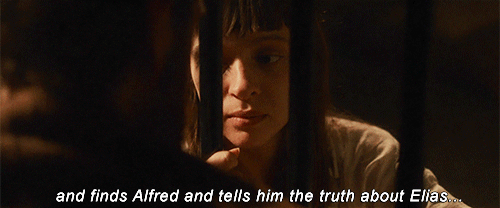
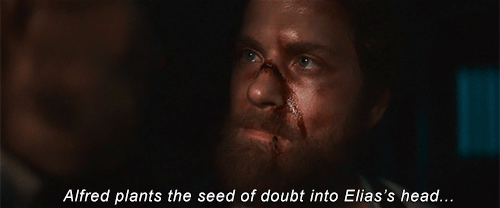



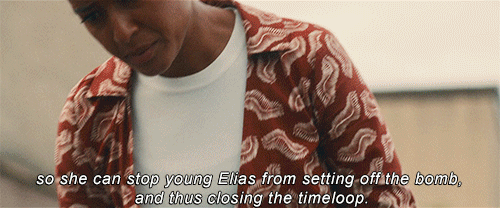
BODIES (2023) | 1.08 'Know You Are Loved' - Team effort spanning spanning 163 years 🤝
#Bodies#Netflix Bodies#bodiesedit#tvedit#perioddramaedit#bodiestvdaily#Shahara Hasan#Alfred Hillinghead#Iris Maplewood#Charles Whiteman#Amaka Okafor#Kyle Soller#Shira Haas#Jacob Fortune Loyd#*#this didn't turn out the way I'd imagined in my head... but I don't really care#I'm just very emotional about these four detectives#💖💖💖
114 notes
·
View notes
Text
Yuletidings 2012: Yuletide Long Ago

1. Santa Claus Hides in the Phonograph (excerpt) – Ernest Hare (1922) 2. Parade of the Wooden Soldiers – Paul Whiteman and His Orch. (1923) 3. Christmas, Christmas, Blessed, Blessed Day - The Metropolitan Quartet (1917) 4. Noel Holy Night (O Holy Night) – The Venetian Trio (1916) 5. On a Good Old-Time Sleigh Ride – The Peerless Quartet (1913) 6. Christmas Bells – Robert Gayler (1919) 7. Chinese Dance/Dance of the Mirilitons from The Nutcracker – The Victor Herbert Orch. (1913) 8. Bells of Christmas – The Edison Concert Band (1913) 9. Scrooge’s Awakening (excerpt) – Albert Whelan (1904) 10. Christmas Carol Medley – The Collegiate Choir (1924) 11. Christmas Hymns – Francis J. Lapitino (1917) 12. Snow Time – The Columbia Quartet (1911) 13. Santa Claus Hides in the Phonograph (excerpt 2) – Ernest Hare (1922) 14. Jingle Bells – The Shannon Quartet (1925) 15. Silent Night, Hallowed Night – The Hayden Quartet (1909)
----------------------------------------
This collection has always been a favorite of mine. It consists entirely of holiday music recorded between 1900 and the early 1920's, transferred from shellac discs and even wax cylinders.
There's something both charming and melancholy about hearing these voices and instruments across such a distance of years, something about the spirits of the people making the music, as well as their styles of playing and singing, which really bring that vanished era to life.
Imagine a time when recorded sound was still such a novelty that an actor pretending to be Santa Claus could convince children that he was literally hiding inside the Victrola. Consider the fact that the 1913 excerpt from The Nutcracker included here was recorded just twenty years after Tchaikovsky’s death in 1893. (He lived to see the dawn of the Recording Era - in fact, there’s a wax cylinder recording of his voice from 1890 - but not long enough to hear the first recording of his work, which was in 1909.) Or that the excerpt from ‘A Christmas Carol’ included here was recorded in 1909, less than four decades after the death of Charles Dickens.
I especially love the exuberance of the Metropolitan Quartet singing “Christmas, Christmas, Blessed, Blessed Day” and of the Peerless Quartet’s “On a Good Old-Time Sleigh Ride”; also the beautifully arranged and played “O Holy Night” (Titled “Noel Holy Night”) by the Venetian Trio.
The first recording of “Jingle Bells” was made in 1889, though no surviving copies are known to exist. This 1925 version by the Shannon Quartet, however, is quite charming with its barbershop harmonies.
These recordings are all noisy and scratchy and I think it’s part of their charm.
The cover art is a Victorian-era Christmas card to which I added the title.
DOWNLOAD
0 notes
Photo
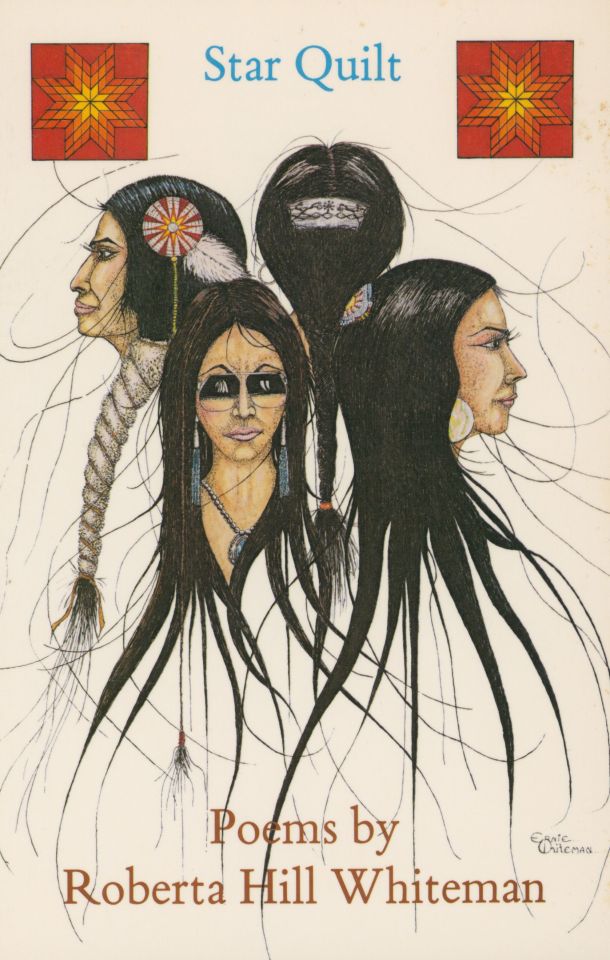
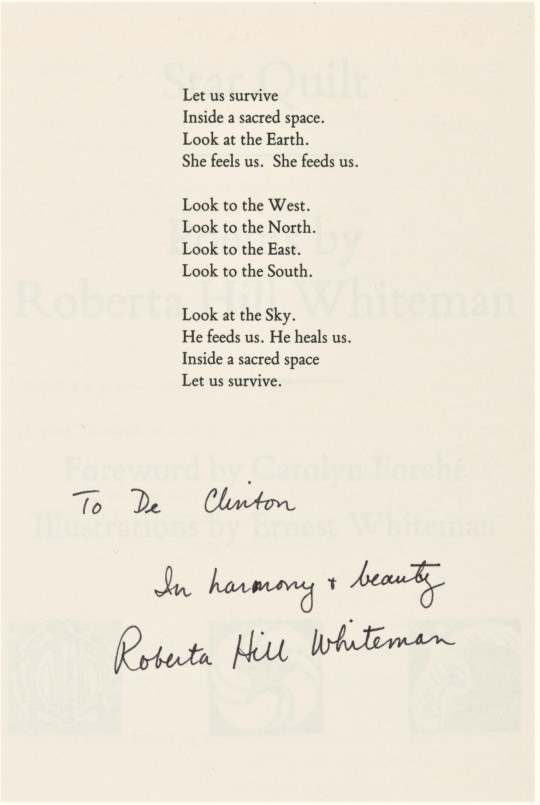
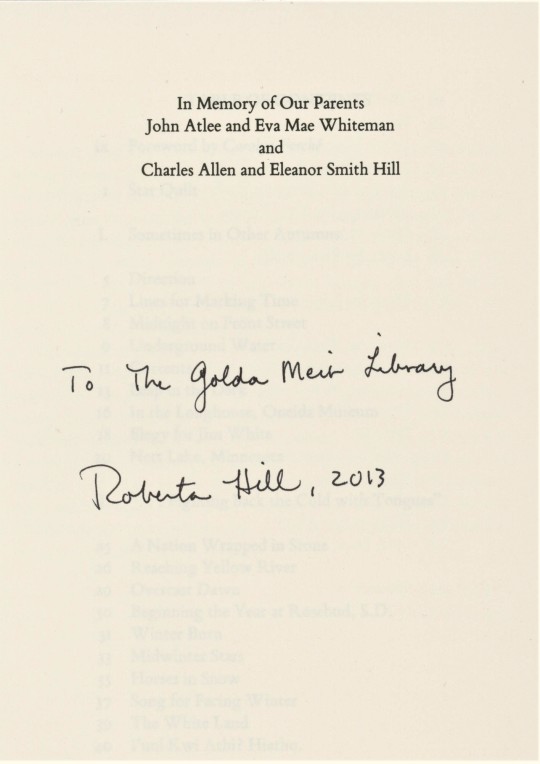
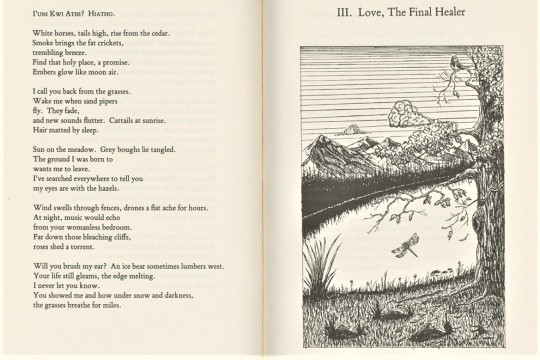
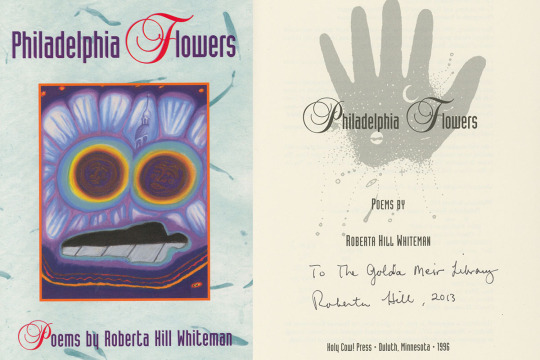
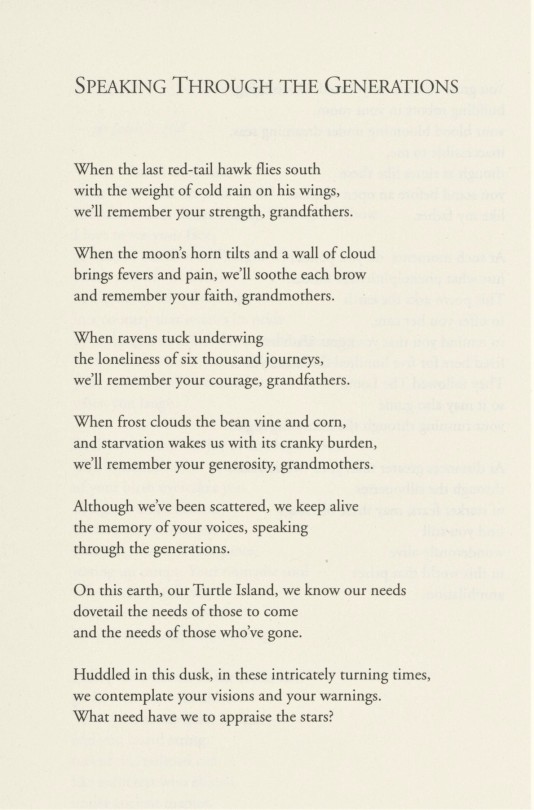
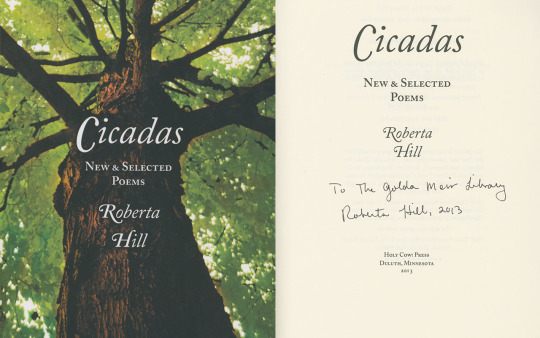
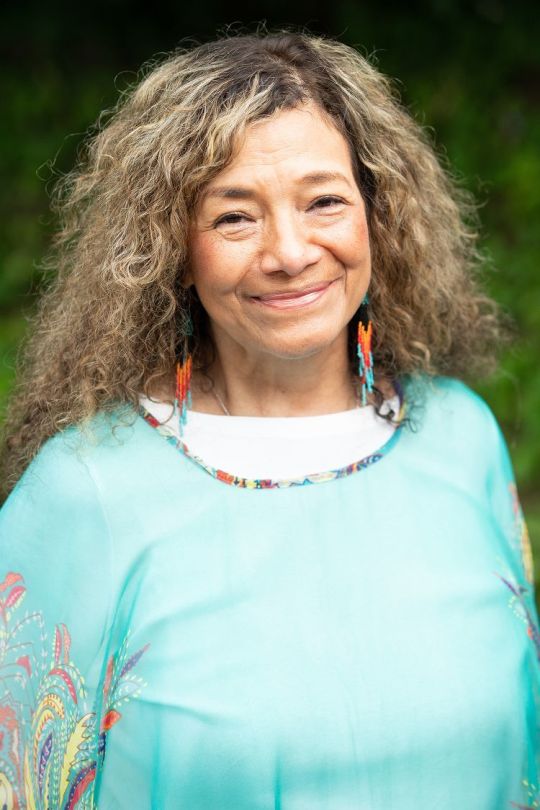
Native American/First Nations Woman Writer of the Week
ROBERTA HILL
This week, we introduce you all to Roberta Jean Hill, formerly Roberta Hill Whiteman, a poet and educator native to Wisconsin! Born in 1947 near Green Bay, Roberta Hill grew up among the Oneida Indigenous peoples of Wisconsin, a rich heritage that enlightens her work as a poet and has driven her scholastic career. In her third poetry collection, Cicadas: New & Selected Poems, published by the Holy Cow! Press in 2013, Hill writes:
To the people, beings and places I love, named or unnamed, met and imagined. May they continue to inspire us to live and keep loving earth and her beings for all eternity.
UW-Milwaukee Special Collections preserves four signed presentation copies of Hill’s poetry books, all published by Jim Pearlman, founder and editor of Holy Cow! Press in Duluth, Minnesota, which is dedicated to publishing writers who live in the American Midwest and focuses on publishing Native American authors and thematic anthologies.
UWM Special Collections holds two copies of Hill’s first collection of poetry, Star Quilt, originally published in 1984 with foreword by poet, editor, professor, translator, and human rights advocate, Carolyn Forché. One is a first printing from 1984, signed in 2013 to our library, while the other is a second printing, illustrated and republished by the Holy Cow! Press in 1985, which is signed to Milwaukee poet and educator DeWitt Clinton.
The illustrations for both printings of Star Quilt were done by Hill’s husband, artist, director of First Nations Film and Video Festival, Inc, and member of the Northern Arapaho tribe, Ernest Whiteman. The cover art for the book is a portrait of a woman facing four ways, hinting at Roberta’s use of the four cardinal directions throughout the book that portray the separation and displacement that the Oneida peoples have experienced in a long history of forced migration by the U.S. government. Throughout the collection, Hill internalizes this feeling of loss and separation, utilizing an extended metaphor of dust in the winds returning to the Earth, from where the peoples are said to have come. The poem above, “I’uni Kwi Athi? Hiatho,” uses Hill’s father’s name, the meaning of which Hill says he never revealed.
In the glossary for Star Quilt, Hill tells the history of quilt making by Plains Indian women, which are designed with a central star for their children and grandchildren, stating, “it is a valuable possession, connecting the generations to one another and the earth.” Hill dedicates this collection to those who inspired her writing, “In Memory of Our Parents John Atlee and Eva Mae Whiteman and Charles Allen and Eleanor Smith Hill”.
Roberta Hill’s second collection, Philadelphia Flowers: Poems, published in 1996, carries many individual poems to and for family and friends, dedicating the collection to her three children, Jacob, Heather, and Melissa. The cover painting and illustrations for Philadelphia Flowers are again by Ernest Whiteman. Hill’s final and most recent collection, published in 2013, Cicadas: New & Selected Poems, reprints poems selected from Star Quilt and Philadelphia Flowers and acts as a follow-up to her recent life experiences; including a longer individual poem dedicated to Hill’s late brother-in-law, “Ernie” Whiteman.
Also held by our department is a fine press printing of an excerpt of Roberta Hill’s poem, Your Fierce Resistance, published in 1993 by the Minnesota Center For Book Arts in conjunction with The Loft’s Inroads: Writers of Color series. Be on the lookout for more on this beautiful production coming later!
After graduating with a BA from the University of Wisconsin-Green Bay, Hill earned an MA in fine arts from the University of Montana, and completed her PhD in American Indian Studies at the University of Minnesota. Hill’s doctoral thesis honors the work of her paternal grandmother, Dr. Lillie Rosa Minoka-Hill, through a biographical study of her life as the second American Indian woman to earn an M.D.in the U.S. Roberta Hill has held several academic positions and is Professor Emerita of English and American Indian Studies at the University of Wisconsin-Madison.
See other writers we have featured in Native American/First Nations Woman Writer of the Week.
–Isabelle, Special Collections Undergraduate Writing Intern
We acknowledge that in Milwaukee we live and work on traditional Potawatomi, Ho-Chunk, and Menominee homelands along the southwest shores of Michigami, part of North America’s largest system of freshwater lakes, where the Milwaukee, Menominee, and Kinnickinnic rivers meet and the people of Wisconsin’s sovereign Anishinaabe, Ho-Chunk, Menominee, Oneida, and Mohican nations remain present.
Author Portrait from the Library of Congress
#Native American/First Nations Woman Writer of the Week#National Poetry Month#Native American Poets#indigenous writers#Roberta Hill#Roberta Jean Hill#Roberta Hill Whiteman#Star Quilt#Philedelphia Flowers: Poems#Cicadas: New and Selected Poems#Ernest Whiteman#Jim Pearlman#Holy Cow! Press#Wisconsin#Carolyn Forche#Oneida#Arapaho#Quilt Making#Your Fierce Resistance#Poetry Books#Minnesota Center for Book Arts#UW Madison#UW Green Bay#The Loft#Inroads#Writers of Color Series#Isabelle
69 notes
·
View notes
Photo

Chapter 26
The sun had set long ago and they were all crowded around a card table in Louise Brooks apartment, the radio playing “Side by Side” by the Paul Whiteman Orchestra. Sipping a glass of bourbon, Louise was humming merrily along, but Nelly’s lips were set in concentration. She wasn’t a good bridge player by any measure, but the important thing was that she was getting better. They were in no danger of hitting a grand slam, but Buster thought they might be able to get a small slam out of the game. Keeping his eyes on their cards, he tilted his whiskey glass to his lips, emptying it.
“Top you off?” said Louise.
Buster looked at Nelly, who raised an eyebrow. “Not tonight,” he said, and saw Nelly’s shoulders relax. He kissed her behind the ear and saw her cheeks redden in the lamplight.
George laid down a seven of clubs, Buster threw in a five of clubs, Louise put in a four of diamonds, and Nelly swept the trick for them with a six of diamonds. George had a good poker face. Louise’s was skilled simply by virtue of the fact that she was usually in a good humor whether her hand was bad or good. Nelly needed to work on hers. She straightened her expression as if hearing his thoughts.
He’d been living a double life for years now, but with Nelly in the picture, it had lately become a triple life. Buster One was the gay host always ready for sport, drink, and good company. The quiet man left in the gay fellow’s wake was Buster Two, who never forgot that Lady Luck would decide someday to be done with him, and maybe soon. Buster Three was content to spend afternoons and evenings with his girl in her small apartment where she watched him work out gags for Snap Shots and sat patiently as he gave her bridge lessons. She found him pleasing in bed, and never complained that the only dance floor he led her across was her living-room carpet and their only orchestra the tabletop phonograph he’d bought her. As February gave way to March, his routine of visiting her apartment two or three days a week for a couple hours at a time seldom changed. Twice he’d taken her for a drive into the Valley, although that was always risky in case someone recognized his car as he left town and got to wondering about the girl in the passenger seat. Last weekend they’d had their first bridge game with George and Louise, the first time anyone else had seen them together. Nelly had had the time of her life.
Buster Three couldn’t help wanting more, though. He longed to take her to a picture or have her on his arm during a premiere or benefit, dressed to the nines. He imagined her warming his bed at night, swimming laps in his pool in the morning, and playing bridge games in the billiards room on weekday afternoons. He was finding out that a mistress was a funny thing that way. The more you got of her, the more you wanted.
He stroked her back as she looked over at his hand, deciding which card to play next. They could take at least five more tricks by his count, which would put them at eight. Whether Nelly would spot them was the question. They were playing for a nickel a point. He’d wanted to do quarters, but Nelly had complained about how bad she was and insisted on a lower bet, so he let her have her way.
It was now getting close to ten o’clock. He knew they’d have to wrap the game up in the next half hour if he wanted to be home by midnight. It was the first time he’d stayed out so late with Nelly and not told Natalie where he was going.
“Just Molly and me,” Louise sang in a soft, idle voice, examining her cards. “And baby makes three. We’re happy in my blue heaven.”
Nelly yawned and he rubbed her back. “Don’t worry, I’ll get you home soon, sweetheart,” he said in her ear.
Nelly responded with a smile and he was gratified to watch her discard a three of diamonds in the next moment. He was pretty sure he could take the trick with a Jack of diamonds if neither George nor Louise played the Queen.
They left the apartment at a quarter to eleven, many nickels richer. Louise kissed Nelly goodbye on both cheeks. It made Buster happy to see the girls get along so well.
“How’d I do tonight?” said Nelly, as they walked through the darkness toward his Lincoln town car, holding hands.
“You’ll be able to play pro soon at the rate you’re going.”
She squeezed his hand. “Don’t tease.”
“Well okay, but we can start playing for quarters any day now.”
“Maybe dimes,” she said, laughing. “Maybe.” Another big yawn hit her.
“Don't fall asleep yet, you hear? I have things in mind for you.”
“What kind of things?” she said. From her flirtatious tone, he had a pretty good idea that she already knew.
“Let me take you home and I’ll show you.”
Though she was falling asleep on her feet by the time he parked on Genesee Avenue, she allowed him to walk her inside, persuade her onto the couch, and lift up her skirts. That gave her a second wind and she joined in the excursion with enthusiasm. When they were done and he’d buttoned his trousers back up, he watched her wander around the apartment in nothing but her garter belt and stockings, getting ready for bed. Apart from the nudie show, which he enjoyed tremendously, he found he’d missed watching her take down her hair and return from the washroom wearing it in braids, her cheeks shining from scrubbing her face. Tonight the routine was the same except that she was in the buff. He grinned, looking forward to having something to think about on Monday morning when the tedious conversations about Snap Shots resumed with the M-G-M brass and his surplus writers.
After Nelly had brushed her teeth, he followed her into her bedroom and watched her get into underthings and a pink sleeveless nightgown with ivory lace at the bodice.
“Sticking around to tell me a bedtime story?” she said, giving him an impudent smile.
He swatted her derrière in rebuke as she climbed into bed and drew the covers over her. “Sure. What’ll it be?” He sat on the side of the bed.
“I don’t care. Surprise me.”
“Once upon a time Charles Lindbergh flew over the Atlantic to find the prettiest girl in the world.”
Nelly giggled. “Oh, is that what his flights are about?”
“He gets to England. Nothing worth seeing. Same story in France and Italy and Indonesia.”
“Indonesia’s not in Europe.” Nelly was laughing, but her eyes had also closed.
“Who’s telling this story?” he said, tapping her shoulder. “So he gets back in the airplane, flies all the way across the Atlantic again. Gets to New York. All the dames he sees look like dogs practically. Well, he gets back into the airplane again and he commences to visit every state he can, Pennsylvania, Florida, Mississippi, Tennessee. You name it, he visits it. It’s no good. He never saw such ugly girls. Any how, he’s running low on fuel for his airplane and he decides to make a stop in Chicago.”
“Mmm,” said Nelly. Her lids were beginning to twitch.
“While he’s there he goes and sees the sights. He takes an elevator up to the very top of the Tribune Tower. Guess who he meets on the top, top floor?”
Nelly sighed.
“Miss Nelly Foster, that’s who. That’s how he found the prettiest girl in the world.” He leaned over and kissed her forehead. She gave a vague smile at the caress, but otherwise was out like a light. “G’night, sweetheart.”
He collected his jacket and locked her front door with the key she’d given him, which was in his pocket more often than not these days. It was half past midnight by the time he made it home. He half-expected Nate to be waiting in the sitting room or at the foot of the stone staircase demanding to know where he’d been, but the house was silent and dimly lit; he stubbed his toe on his way to the kitchen to see what Caruthers had left in the refrigerator.
Standing in the kitchen eating cold roast and cold cooked carrots from a priceless bone china plate a few minutes later, he was back to being Buster Two, bewildered that this could be his life. Buster wasn’t half bad at Shakespeare. The problem was that Nelly could barely recite her lines without laughing over his sober-faced version of Olivia, who spoke in a high, breathy voice. “Stay,” he would say, “I prithee, tell me what thou thinkest of me,” and clutch his hands in front of his heart so earnestly she would be in stitches.
“That you do think you are not what you are,” she’d answer, giggling.
She had a feeling he was trying to cut her up on purpose, but the straight face never faltered. After a half hour of practicing, Nelly called it a day. She would just have to learn the lines on her own. Buster seemed content to set aside the little green Arden Shakespeare edition of Twelfth Night. He drew his legs onto the sofa and put his head in her lap. She ran her hand through his thick dark hair as he closed his eyes. “You’re burning the candle again, Olivia.”
“Hmmph,” he said.
“Auditions are next Monday night. If I get the part, you’ll have plenty of time to help me rehearse my lines, I guess. The play doesn’t open ‘til the second week of June.”
Buster opened his eyes. “About that.” His brows were pinched.
“What?” she said.
“I’m leaving for New York on the seventh,” he said with a grim expression.
“Oh.” She’d known in an abstract way that Snap Shots took place in New York, but somehow she’d failed to imagine that Buster might shoot on location. Knowing now how he had traveled in order to film Our Hospitality, The General, and Steamboat, it was a conclusion she should have come to. “How long will you be gone?”
Buster sighed. “July. If I’m lucky.”
“How long have you known?” she said, wondering why he had waited to bring it up to her.
“Awhile. Before we started going together. Guess I just thought the day’d never get here.”
“I’ll miss you,” she said frankly, as she combed her fingers through his hair.
“I know,” said Buster. “I’ve been thinking about how to get around it. Maybe I’ll send for you at the halfway point or something. You ever been to New York?”
“Not once,” she said. She briefly considered the practicalities of traveling all the way across the country while trying to keep her job at United Artists and, if her tryout with the Los Angeles Players Company was successful, star in a play at the same time. She was also thinking of his wife, who would doubtless accompany him. Buster, always so honest and hopeful when he built castles in the air, plainly had not thought of this.
“Well, I got some good news, anyway. That was the bad news. Wanna hear it?” He looked up at her so earnestly that she couldn’t resist bending her head to kiss his mouth.
“Of course.
“I just rented a place just outside the M-G-M lot. A bungalow. Figured it’d save me some time going home every day. Plus you could stay the night. I got it all worked out.”
“Oh?” It sounded risky, but her stomach fluttered at the idea.
“Sure. I’ll pick you up and take you there after dark. We get up before the sun comes up and no one’s the wiser. I can get you over to United Artists in the morning.”
The scheme was more than a little hairbrained, but to Buster’s credit it worked. For two weeks before he left for New York, Nelly spent Monday, Wednesday, and Thursday evenings at the bungalow. It was actually a double bungalow with separate entrances, the other half belonging to Edward Sedgwick, Buster’s new director, who used it as an office during business hours. Sedgwick’s half was always dark by the time Buster ushered Nelly through the door after nightfall, though. Buster’s side of the bungalow was a combination dressing room and gymnasium. The dressing room occupied the first room and contained a stove, refrigerator, and worktop so Caruthers could whip up meals. Like Sedgwick, he too was always gone by early evening, but left a hot dinner for two ready, never asking (or so Buster said) why he was cooking for two. The second room held weight equipment, a rowing machine, a punching bag, and other exercise equipment. Nelly had learned a few weeks back that Buster’s splendid physique was not the result of pratfalls, but of dedicated training. Off the gymnasium there was a small washroom, and at the back of the house a little bedroom with a double bed, a nightstand, and a chair. It was here that Nelly would fall asleep next to Buster, waking up more often than not in his arms.
The alarm clock would ring at a rude five a.m. and Buster would reach over her to silence it. Sometimes they would make love. Other times, Buster would fall back asleep and Nelly would watch him, letting him seize a few extra minutes before reluctantly shaking him awake again. Although he had every outward appearance of boundless energy when he was around her, she could tell in the droop of his eyes and the redness that occasionally invaded them that he was always tired. It was no wonder. There were bridge games with Louise and George Marshall, often stretching until midnight, and when there weren’t bridge games, he was practicing songs on the ukulele while she studied her lines, having recently gotten the part of Maria in Twelfth Night. In spare minutes, he’d tell her about baseball games, meetings with the M-G-M bigwigs, and lunches with other stars. He didn’t seem to have a second of his day that wasn’t filled.
One subject he didn’t discuss was his wife and children. It was as if that part of his life didn’t exist, though Nelly knew that he must spend time with them. At first, she hadn’t wanted to know about Natalie because it would have curdled her with guilt to think that she was monopolizing another woman’s husband. Now she didn’t want to know because her feelings for Buster had strengthened. She could almost convince herself that if she didn’t acknowledge that other part of his life, the fairytale that was their time together could stay in place forever.
And it was like a fairytale, even the ordinary parts, like Buster stumbling out of bed so he could go into the front room and make coffee. She loved his sleep-mussed hair and bare feet, the bleary way he groped for his pack of cigarettes and lit the first one of the day, how he would shrug on a dressing gown over his underthings—if he was even wearing underthings, which was never a guarantee when they were sharing a bed. While he was thus occupied, she would get dressed for the day and throw on a dab of lipstick and a quick brush of mascara. As the coffee percolated and Buster dressed, she’d make breakfast, either wheat cakes with eggs or steak and eggs. They always kept the curtains drawn, and if any early-morning peddler knocked on the door to attempt to sell Buster vegetables, soap, and any other number of commodities, she would creep to the back door and leave Buster to turn them down.
Despite their precautions, spending the night at the bungalow still felt dangerous. Nelly knew it would take only one pair of unfriendly eyes to spot them and the jig would be up. Buster, she thought, was much too casual on this point and she always made him double-check that none of his neighbors were peeping out of their homes as she hurried into his car between six and six-fifteen-a.m., depending on how long she’d let him sleep or whether carnal matters had preoccupied them for an extra ten minutes. Even so, it was hard to stay nervous with his cheery attitude. He had only to throw her one of his beautiful smiles, upper teeth straight and gleaming, and she would be set at her ease again.
Notes: Is this chapter too sentimental? Be honest.
I should warn you that because life is hectic right now for me, I’ll probably go down to an every-other-week update. I was away this weekend and got to working on Chapter 26 when I returned, only to discover I needed to add just two sentences to it. -_- Sorry for the delay. There are some anachronisms here and there will be in the future. Louise Brooks wasn’t in the States at this time. I think I did get the timing on the bungalow right, though. The opening part of the second part of this chapter takes place around March 24th.
14 notes
·
View notes